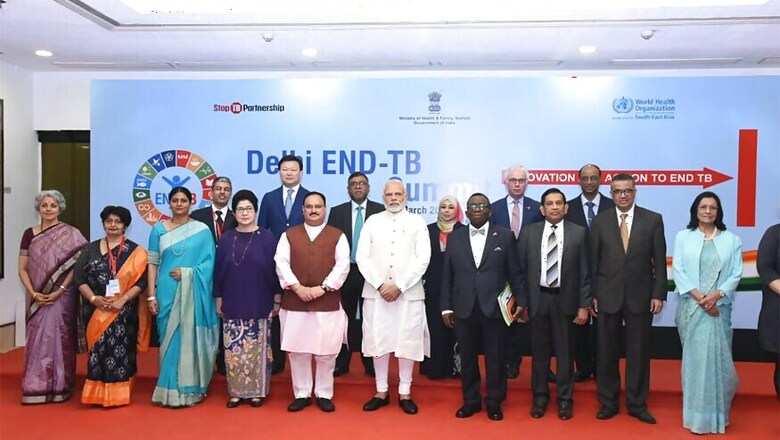
views
New Delhi: The coming two days could well decide whether India would be able to eliminate tuberculosis by 2025. The global 'End TB Meet', kicked off on Tuesday with Prime Minister Narendra Modi reiterating his promise to eliminate the disease in India five years ahead of the world's target, and Union health minister JP Nadda promising heavy strategising in the next two days.
Nadda said the strategies and way forward for India's 2025 goal, the World Health Organisation's ministerial meeting and the STOP TB partnership will be hash out over the course of this conference.
All eyes are on India currently, as the PM stressed on the significance of this meet, the only one before heads of state gather in New York in September 2018, for the high-level UN meet on TB.
WHO Director General Dr. Tedros Adhanom Ghebreyesus congratulated India on showing political will to tackle the problem, as Russian president Vladimir Putin had at the Moscow meet in November 2017.
India's numbers - one fourth of the world's TB cases and deaths - could tip the world's TB disease burden for better or worse. It had an estimated 28 lakh cases and 4.8 lakh deaths in 2015.
While Nadda, in a speech that had very little to do with tuberculosis, enthusiastically thanked Modi for making health part of mainstream conversation in the past four years, the PM took stabs at India's past efforts to tackle the illness.
What was missing, however, was any glimpse into what the upcoming strategies might entail.
The promise to rid the country of this disease by 2025 was made in the 2017 union budget, and was met with disbelief by those working in the health sector. News18 had reported in March 2017, Nadda's promise that the draft national strategy to eliminate TB would be worked out in a month.
The PM touched upon measures that have already been rolled out - Rs 500 per patient per month for nutritional support transferred to bank accounts, over a 1000 CBNAAT machines for better diagnostics, the global TB research consortium - while launching the TB-Free India Campaign.
What didn't come up is a global appeal to scale up India's access to new drugs. India is still struggling to provide two essential medicines - bedaquiline and delamanid - in sufficient quantities to patients with multidrug resistant TB.
On Tuesday, 60 civil society groups and activists and TB survivors from India wrote to the government to grant Indian generic manufacturers compulsory licenses to create affordable versions of these drugs.
India has an annual estimate of 1.3 lakh multi-drug resistant TB patients, the highest in the world, the letter quoted the Central TB Division, Annual Status Report, 2017. Its current stock of bedaquiline and delamanid depends on a donation by parent companies Johnson and Johnson for bedaquiline and Otsuka for delamanid. This will run out by April 2019.
As the letter points out the actual cost of the six month drug course will be $900 in India for bedaquiline and $1700 for delamanid, unaffordable for most patients in India.
Though the PM pointed out how TB was a disease that affected the most poor, he did not touch upon access to medicines.
Though Indian generic medicine manufacturers, known for their abilities to reverse engineer patented drugs and create affordable versions, can supply the two drugs at the required rate of USD 48 to 102 for bedaquiline and USD 36 to 96 for delamanid, the process will take them two years.
The letter asked the government to grant a generic use licence to these companies, as soon as possible, for the process to start.
"The grant of a government use license on grounds of public non-commercial use (under section 92) would create competition, significantly reduce government expenditure, provide impetus to the scaling up of access to these new TB drugs globally and help kick start the generic supply of new TB drugs to the national TB programme by 2019," it read.




















Comments
0 comment